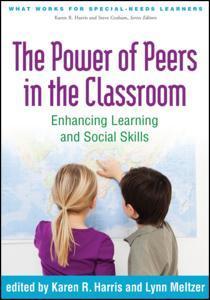Description
The Power of Peers in the Classroom
Enhancing Learning and Social Skills
What Works for Special-Needs Learners Series
Coordinators: Harris Karen R., Meltzer Lynn
Language: English
Subjects for The Power of Peers in the Classroom:
Publication date: 08-2015
· 20.3x26.7 cm · Paperback
Publication date: 07-2015
· 20.3x26.7 cm · Hardback
Description
/li>Contents
/li>Readership
/li>Biography
/li>
Peer support and social relationships have a tremendous influence on development, motivation, and achievement for all students, including struggling learners and those with disabilities. This highly practical book is one of the few resources available to guide classroom teachers and special educators in the application of peer-assisted instructional strategies in grades K-12. Expert contributors describe evidence-based approaches for building students' skills in reading, writing, math, and other content areas, as well as social competence and executive functioning. Sample lessons and more than a dozen reproducible tools are provided. Purchasers get access to a Web page where they can download and print the reproducible materials.
1. Executive Function and Peer Mentoring: Fostering Metacognitive Awareness, Effort, and Academic Success, Lynn Meltzer, Michael Greschler, Katelyn Kurkul, & Wendy Stacey
2. Peer Interactions in the Content Areas: Using Differentiated Instruction Strategies, Kelley S. Regan, Anya S. Evmenova, Margo A. Mastropieri, & Thomas E. Scruggs
3. “Thank You for Helping Me Write a Better Paper”: Peer Support in Learning to Write, Anne Mong Cramer & Linda H. Mason
4. Using Collaborative Strategic Reading to Promote Student Discourse, Karla Scornavacco, Brooke Moore, Alison Boardman, Cristin Jensen Lasser, Pamela Buckley, & Janette K. Klingner
5. Peer-Assisted Learning Strategies to Improve Students' Word Recognition and Reading Comprehension, Devin M. Kearns, Douglas Fuchs, Lynn S. Fuchs, Kristen L. McMaster, & Laura Saenz
6. Peer-Assisted Learning Strategies in Mathematics, Sarah R. Powell & Lynn S. Fuchs
7. Maximizing the Benefits of Working Cooperativelywith Peers, Kimber L. Wilkerson & Jenna L. Lequia
8. Peer-Supported Instruction for English Learners, Cara Richards-Tutor, Terese Aceves, & Colleen Reutebuch
9. The Power of Preschool Peers to Influence Social Outcomes for Children with Special Needs, Phillip S.Strain & Edward H. Bovey II
Karen R. Harris, EdD, is the Mary Emily Warner Professor in the Mary Lou Fulton Teachers College at Arizona State University, and a former general and special education teacher. Her research focuses on theoretically based interventions for the development of academic and self-regulation abilities among at-risk students and those with disabilities, as well as effective models of inservice teacher preparation for writing instruction for all students. She developed the Self-Regulated Strategy Development model of strategies instruction. The former editor of the Journal of Educational Psychology, Dr. Harris is coauthor or coeditor of several books and over 200 peer-reviewed publications. She is a recipient of the Distinguished Researcher Award for special education research from the American Educational Research Association and the Career Research Award from the International Council for Exceptional Children. She is President of Division 15 (Educational Psychology) of the American Psychological Association and has served as President of the Division for Research of the Council for Exceptional Children.
Lynn Meltzer, PhD, is President and Director of the Institutes for Learning and Development (ResearchILD and ILD) in Lexington, Massachusetts. She is also an Associate in Education at the Harvard Graduate School of Education and a Fellow and past president of the International Academy for Research in Learning Disabilities. For 29 years, she was Adjunct Associate Professor in the Department of Child Development at Tufts University. Dr. Meltzer is founder and chair of the International Learning Differences Conference, which was established in 1984 and is held at the Harvard Graduate School of Education. Her 40 years of neuropsychological evaluations and clinical consultations with children, adolescents, and adults have emphasized the theory-to-practice cycle of knowledge. She has been an invited speaker at numerous national and international conferences,




